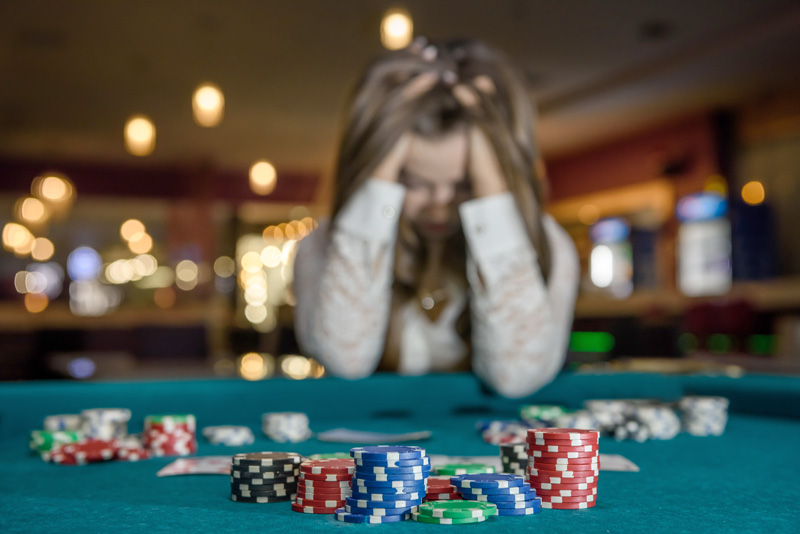According to the CDC (CDC, 2020) suicide is the 10th leading cause of death in the United States. This is a concerning statistic and many people struggle with their mental health every day. There are many factors that may lead someone to think that suicide is the only option, but have you ever thought about problem gambling as a source of emotional distress for someone?

There are many people who struggle with problem gambling in the United States. It is estimated that 2 million adults in the U.S. meet the criteria for gambling disorder, with another 4-6 million people in the U.S. struggling with problem gambling (National Council on Problem Gambling, 2020).
For many people, they can gamble and not have a problem. However, for some, gambling can cause problems in their lives. Problem gambling is anytime gambling causes problems or negative consequences in someone’s life. Gambling disorder is a diagnosis by a qualified, trained professional determined by the criteria set forth in the DSM5.
According to the DSM5, a diagnosis of gambling disorder requires at least four of the following during the past year:
- Need to gamble with increasing amount of money to achieve the desired excitement
- Restless or irritable when trying to cut down or stop gambling
- Repeated unsuccessful efforts to control, cut back on or stop gambling
- Frequent thoughts about gambling (such as reliving past gambling experiences, planning the next gambling venture, thinking of ways to get money to gamble)
- Often gambling when feeling distressed
- After losing money gambling, often returning to get even (referred to as “chasing” one’s losses)
- Lying to conceal gambling activity
- Jeopardizing or losing a significant relationship, job or educational/career opportunity because of gambling
- Relying on others to help with money problems caused by gambling
It is important to remember that while all those with a gambling disorder are experiencing problem gambling, not all those struggling with problem gambling have a diagnosable gambling disorder. Whether someone is struggling with problem gambling or gambling disorder, they are at risk of having the negative consequences from gambling seep out into their everyday lives. These effects may not only impact the person struggling with gambling, but also impact their loved ones.

Colleen Jones
People who struggle with problem gambling are also at a higher risk for struggling with other mental health disorders. Two out of three gamblers reported that their mental health suffered as a result of their gambling problems. In addition to struggling with gambling, they may be struggling with other mental health problems such as a mood disorders like depression, personality disorder, and anxiety. Someone struggling with their gambling may be cashing in retirement funds, college funds, or taking out additional credit cards and loans. These impacts can cause someone to feel hopeless, desperate, and alone.
These negative effects can take a toll on one’s mental health. Sadly, problem gambling has one of the highest suicide rates among all addictions. When we look at suicide in the United States, 3.9% of the adult population have suicidal ideations and 0.6% attempt suicide each year (CDC, 2015). While this statistic is alarming, we find that for problem gamblers, the concern continues to grow. It has been found that 37% of those struggling with problem gambling and 49% of those with a pathological Gambling Disorder have suicidal ideations. Statistics also show that 17% of problem gamblers and 18% of those with a Gambling Disorder attempt suicide. This rate is much higher than the general population, and we believe it’s important to raise awareness of this issue through educating community providers and clients.
Problem gambling is often referred to as “the hidden addiction” because there are no physical warning signs to “test for” problem gambling. It can be very difficult to spot, so it may be difficult to know if someone is struggling with this and may be having suicidal ideations. While there are no physical signs, there are still signs to look for if you think someone may be struggling with a gambling problem. Some things to look for are:
- being absent from friend/family events because of gambling,
- feeling stressed or anxious when not gambling,
- low work performance due to absence or preoccupation with betting, and
- lying to family and friends about how much money and time is spent on gambling.
- relying on others to get out of debt, asking for loans or bailouts
- using money needed for necessary expenses, such as food, rent, or medication for gambling
While we cannot physically test for problem gambling, there are screening and diagnostic tools that can be used to initiate a conversation about gambling. A common tool to use is the Brief Biosocial Gambling Screen, or the BBGS. It is a simple three question screen that consists of yes or no answers.
- During the past 12 months, have you become restless, irritable or anxious when trying to cut down on gambling?
- During the past 12 months, have you tried to keep your family or friends from knowing how much you gambled?
- During the past 12 months, did you have such financial trouble as a result of your gambling that you had to get help with living expenses from family, friends or welfare?
If you, someone you know, or a client you work with answers yes to any of these questions, it may be time to start talking about problem gambling. Problem gambling can affect anyone at any point in their lives and can impact friends and families of those struggling with their gambling. It can develop into a gambling disorder, which leads to damaged relationships with loved ones, difficulty at work, and financial problems. These problems can be detrimental to an individual’s mental health. It is important that we start to realize the importance of talking about problem gambling, and what impacts it may have on individuals. If we take the time to educate ourselves and start the conversation, we can help break the stigma and shame out of problem gambling and get those struggling the help that they need. If you or someone you know is struggling with problem gambling, they can visit NYProblemGamblingHELP.org to find out more and get connected to resources.




[…] “Seventeen percent of people with a gambling addiction will attempt suicide,” he said. “Up to 50% will have ideations about suicide. And that doesn’t even include people who lose their families, their friends, their jobs, their homes.” […]